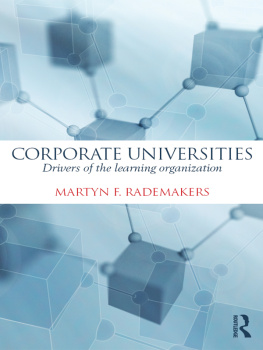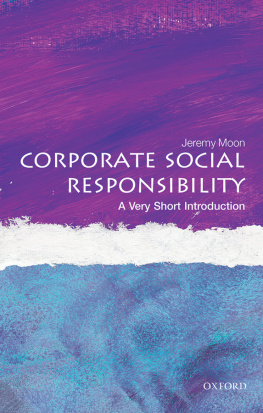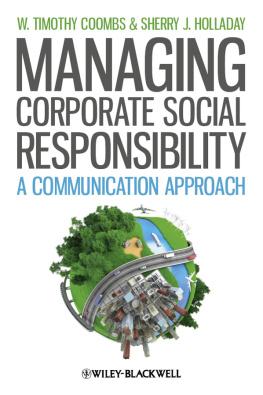EDITION
Strategic
Corporate
Social
Responsibility
This book is dedicated to:
Thea C. Werther,
who understands the idea of responsibility in all its dimensions
and

EDITION
Strategic
Corporate
Social
Responsibility
Stakeholders in a Global Environment
William B. Werther, Jr.
University of Miami
David Chandler
University of Texas at Austin

Copyright 2011 by SAGE Publications, Inc.
All rights reserved. No part of this book may be reproduced or utilized in any form or by any means, electronic or mechanical, including photocopying, recording, or by any information storage and retrieval system, without permission in writing from the publisher.
For information:

| SAGE Publications, Inc.
2455 Teller Road
Thousand Oaks, California 91320
E-mail: | SAGE Publications India Pvt. Ltd.
B 1/I 1 Mohan Cooperative Industrial Area
Mathura Road, New Delhi 110 044
India |
SAGE Publications Ltd.
1 Olivers Yard
55 City Road
London EC1Y 1SP
United Kingdom | SAGE Publications Asia-Pacific Pte. Ltd.
33 Pekin Street #02-01
Far East Square
Singapore 048763 |
Printed in the United States of America
Library of Congress Cataloging-in-Publication Data
Werther, William B.
Strategic corporate social responsibility: stakeholders in a global environment / William B. Werther, Jr.,
David Chandler. 2nd ed.
p. cm.
Includes bibliographical references and index.
ISBN 978-1-4129-7453-0 (pbk.)
1. Social responsibility of business. 2. Social responsibility of businessCase studies. I. Chandler, David, 1969- II. Title.
HD60.W46 2011
658.408dc22 | 2009047305 |
This book is printed on acid-free paper.
10 11 12 13 14 10 9 8 7 6 5 4 3 2 1
Acquisitions Editor: | Lisa Cuevas Shaw |
Editorial Assistant: | MaryAnn Vail |
Production Editor: | Astrid Virding |
Copy Editor: | Jacqueline Tasch |
Typesetter: | C&M Digitals (P) Ltd. |
Proofreader: | Dennis W. Webb |
Indexer: | Jean Casalegno |
Cover Designer: | Candice Harman |
Marketing Manager: | Helen Salmon |
CONTENTS
Foreword to the Second Edition
Mallen Baker
Notes and References
Index
LIST OF FIGURES
PART I WHAT IS CORPORATE SOCIAL RESPONSIBILITY?
Chapter 1
Chapter 2
Chapter 3
Chapter 4
Chapter 5
PART II CSR ISSUES AND CASE STUDIES
Chapter 6
Chapter 8
GLOSSARY OF TERMS
CORPORATE SOCIAL RESPONSIBILITY TERMS1
Consistent definitions, labels, and vocabulary are still emerging and remain hotly debated in the field of CSR. As such, the range of competing terminology that is used can be a source of confusion and disagreement. In our research, for example, we have seen CSR referred to in a number of different ways:
- Corporate responsibility or business responsibility
- Corporate citizenship or global business citizenship
- Corporate community engagement
- Community relations
- Corporate stewardship
- Social responsibility
- Strategic philanthropy
To clarify some of this confusion and provide a consistent vocabulary with which to read this book, brief definitions of the key CSR concepts are detailed below. These concepts and terms are widely discussed in the CSR literature and referred to throughout this book:
CSRTerminology, Concepts, and Definitions
Accountability: The extent to which a firm attends to the needs and demands of its primary stakeholders (see Transparency).
Advocacy advertising: Efforts by firms to communicate their political, social, or business arguments with the intent of positioning themselves favorably in the eyes of the public or of persuading the public of the validity of their point of view.
Business citizenship: Societal-oriented actions by firms designed to demonstrate their role as constructive members of society.
Business ethics: The application of ethics and ethical theory to business decisions.
Cause-related marketing: Efforts to gain or retain customers by tying purchases of the firms goods or services to a benefit provided by the firm to a nonprofit organization or charity. For example, a proportion of sales may be donated to an identified cause.
Civic engagement: Efforts by employees to improve communities in which the firm operates.
Coalitions: Collections of firms, stakeholders, or individuals that collaborate to achieve common goals.
Community advocacy panels (CAPS): Formal or informal groups of citizens who advise organizations about areas of common interest. Topics range widely but can be collectively defined as specific areas in which the organizations actions affect the local community.
Consumer activism: Efforts by actual or potential customers to have their views represented in organizational decision-making. The overarching collection of consumer activism is also referred to as the consumer movement, which has given rise to consumer rights and laws.
Consumer boycott: Action by consumers to avoid specific industries, firms, or products based on performance metrics that they value.
Consumer buycott: Action by consumers to actively seek to support specific industries, firms, or products through their purchase decisions based on performance metrics that they value.2
Corporate citizenship: See Business citizenship.
Corporate philanthropy: Contributions by firms that benefit stakeholders and the community, usually through financial or in-kind donations to nonprofit organizations.
Corporate responsibility: A term similar in meaning to corporate social responsibility, but preferred by some companies.
Corporate social performance: The performance benefits to the firm (often measured in traditional financial or accounting metrics) gained from the implementation of its CSR program.
Corporate social responsibility (CSR): A view of the corporation and its role in society that assumes a responsibility among firms to pursue goals in addition to profit maximization and a responsibility among a firms stakeholders to hold the firm accountable for its actions (see Strategic corporate social responsibility).
Corporate social responsiveness: Actions taken by a firm to achieve its CSR goals.
Corporate sustainability:
Next page










